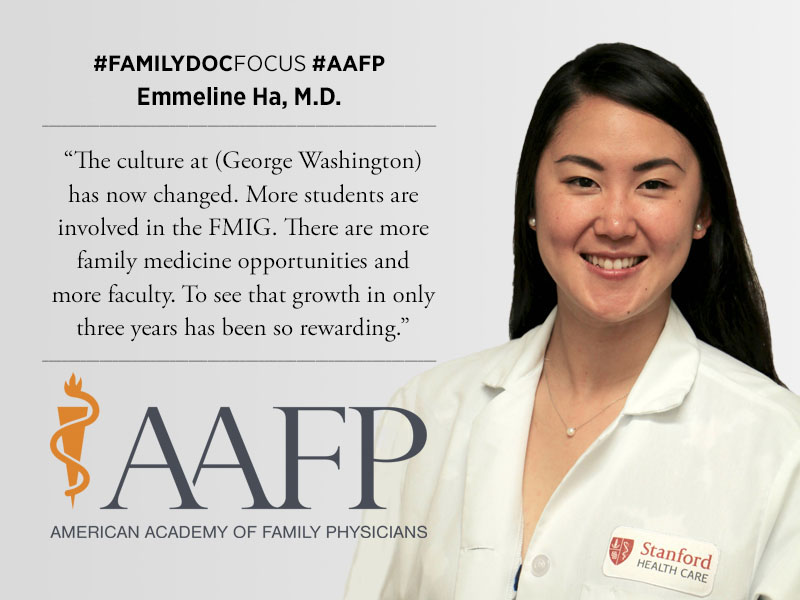Resident Helped Open Her School’s Family Medicine Pipeline
April 12, 2021, 2:43 p.m. David Mitchell — Emmeline Ha, M.D., didn’t have a family physician when she was growing up, but it didn’t take long in medical school for her to know she wanted to be one.

“I realized family medicine was the best field for me because it was about treating someone across their whole life span,” said Ha, a third-year resident at Stanford Health Care’s O’Connor Hospital Family Medicine Residency in San Jose, Calif. “It didn’t matter how old a patient was. I loved getting to know them, treating them as whole person and partnering with them to improve their health.”
The problem for Ha was that her medical school didn’t have a family medicine department.
“Family medicine wasn’t really valued then,” said Ha, who graduated from George Washington University’s School of Medicine and Health Sciences in 2018. “When you are in an environment like that, you have to learn to advocate for the field and for yourself.”
Ha and classmate Matthew Davis, M.D. — now a third-year resident at the Family Medicine Residency of Idaho — took on leadership roles in George Washington’s Family Medicine Interest Group, which forged partnerships that allowed GW students to participate in family medicine events at Georgetown and Howard University as well as Unity Health Care’s National Family Medicine Residency. The FMIG also networked with other campus groups related to primary care.
Students and their faculty advocate, Andrea Anderson, M.D., a local family physician and community preceptor, petitioned the administration for more family medicine opportunities. In August 2018 — a few months after Ha and Davis graduated — GW launched a division of family medicine within its emergency medicine department with one full-time staff member. The division now has four full-time staff physicians, including Anderson.
During Ha’s fourth year, George Washington’s FMIG was recognized by the AAFP with a Program of Excellence Award. (Applications for this year’s awards close April 30.)
“It was great that our little FMIG at a ‘target school’ was honored nationally by the AAFP,” Ha said. “The culture at GW has now changed. More students are involved in the FMIG. There are more family medicine mentorship opportunities and more faculty. To see that growth in only three years has been so rewarding.”
Before GW created its family medicine division, Ha went looking for her own opportunities and found one through the AAFP’s National Conference of Family Medicine Residents and Medical Students. There, Ha connected with leadership from a federally qualified health center in Seattle that cares for a largely Asian immigrant population. That resonated with Ha, the child of Vietnamese refugees.
Ha spent a rotation there and was impressed with an FQHC whose physicians and staff provided inpatient care, obstetrics, behavioral health care, point-of-care ultrasound, sports medicine, nutritional guidance, interpreter services and more.
“It was my first time being so immersed in a well-connected family medicine environment, and I loved it because I used my language skills and treated patients of all ages,” she said. “It firmed my decision.”
Ha was drawn to Stanford’s residency in San Jose, in part, because of the city’s large Vietnamese population.
“It’s been very rewarding,” she said. “As a physician, you can see a big difference when patients have someone who can speak their language and explain to them what’s going on. In my generation, there’s a call to give back to our communities because of all that our families have done for us, coming to America with literally nothing and creating opportunities for us.”
Ha will graduate soon and hopes to continue her training with a health policy fellowship. She already has gained experience as an advocate, serving as a delegate and alternate delegate during the student and resident congresses at National Conference. She served as a student board member for the Washington, D.C., AFP and now is a member of the California AFP’s Student and Resident Council.
Ultimately, Ha would like to practice at an urban health center and also collaborate on community health projects. She said she first learned the value of hard work and teamwork in her parents’ Vietnamese restaurant while growing up in Virginia.
“It was big part of my life,” she said. “I am where I am today because of the sacrifices my parents made. It makes me understand that I want to do more than just focus on myself. I want to give back to others.”
Ha was one of 16 recipients of the AAFP Award for Excellence in Graduate Medical Education in 2020. This year’s honorees will receive a $1,000 scholarship and complimentary registration for the virtual Family Medicine Experience, which is scheduled for Sept. 28-Oct 2. The application deadline for the 2021 awards is June 8.